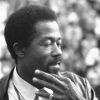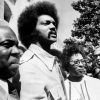calsfoundation@cals.org
Black Americans for Democracy (BAD)
aka: Students Taking a New Direction (STAND)
aka: Black Students Association (University of Arkansas, Fayetteville)
The Black Americans for Democracy (BAD) was a group organized by African American students at the University of Arkansas (UA) in Fayetteville (Washington County) to provide a united voice seeking to change discriminatory practices on campus. The campus was officially integrated in 1948 when Silas Hunt enrolled in the University of Arkansas School of Law. However, two decades after integration, the Black student population was still small, and Black faculty and staff even fewer. In April 1968, after the assassination of Dr. Martin Luther King Jr., the Black students on campus formed BAD to advocate for themselves. The organization exists today as the Black Students Association.
BAD’s first public action took place the month after King’s assassination. The student newspaper, the Arkansas Traveler, refused to print a letter written by Black student John Rowe even after he revised it multiple times. On May 14, 1968, a group of BAD members peacefully blocked the entrance to Hill Hall, where the Traveler office was located. The protest was not just about the Rowe letter, but the letter served as a catalyst for BAD to speak out against discrimination on campus. BAD had a list of thirteen demands, including ending discrimination in room assignments, sororities, fraternities, and athletics; enactment of policies for reporting unfair classroom treatment to a faculty-student committee; creation of a Black history course; recruitment of Black faculty, administrators, and staff; and banning the playing of the song “Dixie” and the use of Black face grease paint at official university functions. After negotiations were held among administrators, the board of publications, the associate editor of the Traveler, and BAD representatives, the protest disbanded after roughly seven hours.
On November 25, 1969, members of BAD attended a pep rally in the Greek theater and sat in the chairs reserved for musicians to keep the band from playing “Dixie.” The microphones were turned off so the students could not be heard, and the pep rally moved to the Wilson Sharp dormitory. Comments from around campus and across the state poured in with strong opinions both for and against the song.
The student senate voted 28–6 to discontinue the playing of “Dixie.” UA president David Mullins declared that the decision rested with the band director. Conditions on campus turned violent when, on December 5, the night before the famed Razorback game against the University of Texas—a game attended by Richard Nixon and other national figures—a Black student, Darrell Brown, was shot in the leg in a drive-by shooting. The band director agreed to stop playing “Dixie.”
BAD met on average twice monthly during the academic year to discuss grievances and share information. As BAD grew in prominence, there was greater communication with the university administration, and the UA president and other administrators sometimes attended meetings to speak about certain issues and address grievances. By the early 1970s, BAD had an active theatrical committee, choir, and intermural sports team. BAD also began Black Emphasis Week to promote social activities for the Black students, as well as to share Black culture with the campus. The program varied over the years and included art, films, fashion shows, talent shows, beauty pageants, a banquet, speakers, and concerts.
In October 1971, BAD started a newspaper. It was published under three different titles: the BAD Times, Black Americans for Democracy News, and Times (Black Americans for Democracy). The first issue declared that the BAD Times sought to facilitate community among African Americans on campus. In 1972, the paper readdressed the goals for BAD to include providing a focus for Black students, bettering communication between Black students and campus leaders, and making campus life more meaningful for all. It also urged UA to recruit more minority faculty, staff, and students, as well as to abolish discriminatory practices.
The BAD Times shared information about resources and social activities. It also provided a place to list grievances and point out specific instances of discrimination. Articles profiled Black faculty and staff and recorded milestones such as the first Black student body president, cheerleader, homecoming maids, and Reserve Officers’ Training Corps (ROTC) instructor. As the number of Black student athletes grew, the paper began to include a regular sports section. The paper was staffed with many of the students who were themselves breaking down barriers. Author E. Lynn Harris was one of the editors of the BAD Times, along with being the first Black male cheerleader and the first Black editor of the yearbook, the Razorback. The paper continued to be published through 1977.
As the number of Black faculty and staff increased, BAD membership became open to them as well. In the fall of 1979, the group changed its name to Students Taking a New Direction (STAND) in order to portray a more positive image. Then in the late 1980s, the name was changed to the Black Students Association. The organization remains active at UA.
For additional information:
BAD Times: A Digital Collection of the Black Americans for Democracy Newspapers. Special Collections, University of Arkansas, Fayetteville. http://digitalcollections.uark.edu/cdm/landingpage/collection/BADTimes (accessed December 23, 2025).
Black Americans for Democracy Materials. Special Collections. University of Arkansas Libraries, Fayetteville, Arkansas.
Leflar, Robert A. The First 100 Years: a Centennial History of the University of Arkansas. Fayetteville: University of Arkansas Foundation, 1972.
Morgan, Gordon D. The Edge of Campus: A Journal of the Black Experience at the University of Arkansas. Fayetteville: University of Arkansas Press, 1990.
Robert A. Leflar Papers. Special Collections. University of Arkansas Libraries, Fayetteville, Arkansas.
Robinson, Charles F., II, and Lonnie R. Williams, eds. Remembrances in Black: Personal Perspectives of the African American Experience at the University of Arkansas. Fayetteville: University of Arkansas Press, 2010.
“Student Senate Votes 28–6 to Discontinue Playing Dixie.” Arkansas Traveler, December 3, 1969, p. 1.
“Traveler Publication Blocked.” Arkansas Traveler, May 15, 1968, p. 1.
“U of A Black Students Disrupt Pep Rally.” Arkansas Traveler, December 2, 1969, p. 1.
Amy Leigh Allen
University of Arkansas Libraries








Comments
No comments on this entry yet.